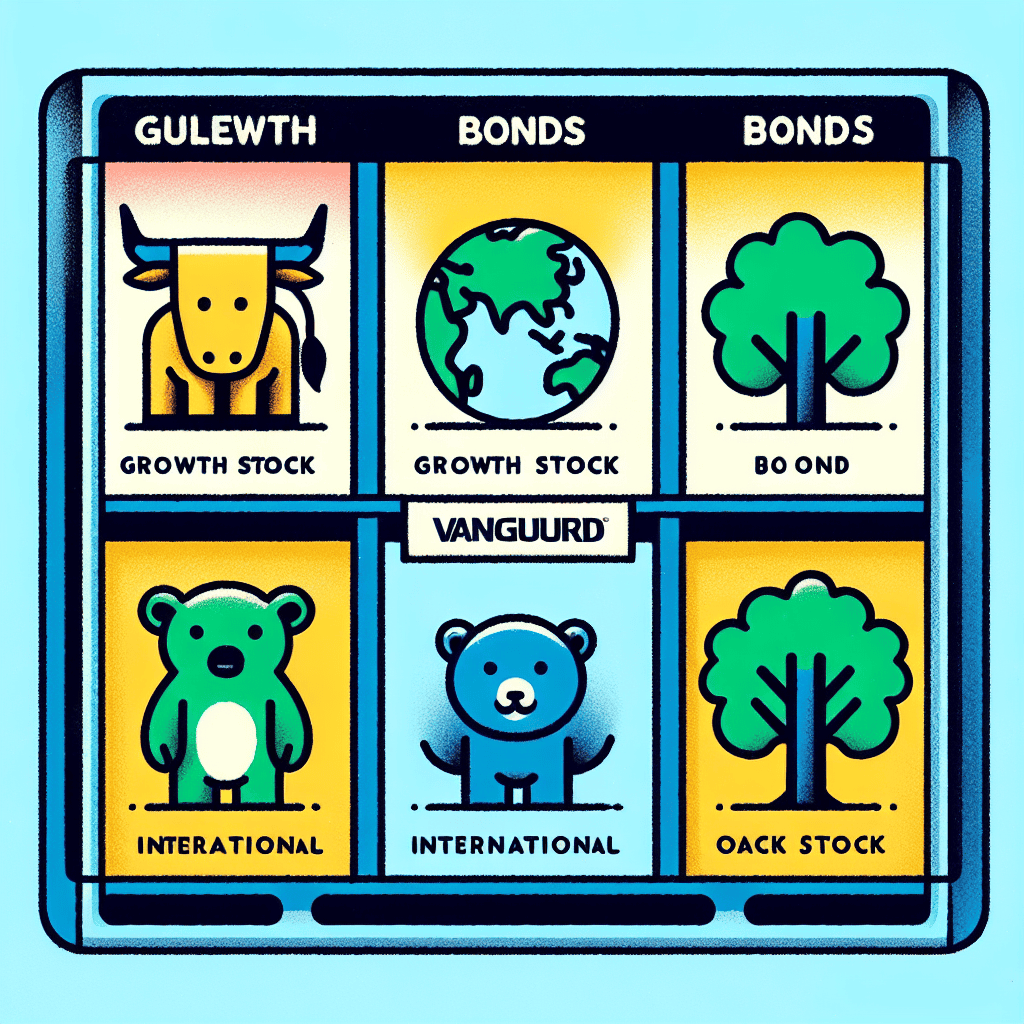“Achieve Financial Harmony: Diversify with 4 Vanguard ETFs”
Introduction
Building a balanced stock portfolio is a crucial step for investors seeking to achieve long-term financial growth while managing risk. Vanguard, renowned for its low-cost and diversified investment options, offers a range of Exchange-Traded Funds (ETFs) that can serve as foundational components of a well-rounded portfolio. This guide explores four Vanguard ETFs that provide exposure to different sectors and asset classes, helping investors create a diversified and resilient investment strategy. By incorporating these ETFs, investors can benefit from broad market coverage, potential growth opportunities, and a balanced approach to risk management.
Understanding Vanguard ETFs: A Beginner’s Guide
Investing in the stock market can be a daunting task for beginners, especially when faced with the myriad of options available. However, Exchange-Traded Funds (ETFs) offer a simplified and efficient way to build a diversified portfolio. Among the many providers, Vanguard stands out due to its reputation for low-cost, high-quality investment products. Understanding Vanguard ETFs is crucial for any investor looking to create a balanced stock portfolio. By focusing on four key Vanguard ETFs, investors can achieve a well-rounded exposure to various sectors and markets.
To begin with, the Vanguard Total Stock Market ETF (VTI) is an excellent foundation for any portfolio. This ETF provides exposure to the entire U.S. stock market, encompassing large, mid, small, and micro-cap stocks. By investing in VTI, one gains access to over 3,500 stocks, which significantly reduces the risk associated with individual stock picking. The broad diversification offered by VTI ensures that investors are not overly reliant on the performance of a single sector or company. Moreover, with its low expense ratio, VTI is an attractive option for cost-conscious investors seeking comprehensive market exposure.
Transitioning from domestic to international markets, the Vanguard Total International Stock ETF (VXUS) complements VTI by offering exposure to global equities outside the United States. This ETF includes stocks from both developed and emerging markets, providing a balanced international diversification. By incorporating VXUS into a portfolio, investors can mitigate the risks associated with economic downturns in any single country or region. Furthermore, the inclusion of emerging markets offers the potential for higher growth, albeit with increased volatility. Thus, VXUS serves as a vital component in achieving a truly global investment strategy.
In addition to broad market exposure, sector-specific investments can enhance a portfolio’s balance. The Vanguard Information Technology ETF (VGT) is an ideal choice for those looking to capitalize on the growth potential of the tech sector. Technology has been a driving force in the global economy, and VGT provides targeted exposure to this dynamic industry. By investing in VGT, investors can benefit from the innovation and growth associated with leading tech companies. However, it is important to recognize that sector-specific ETFs can be more volatile than broad market ETFs, necessitating careful consideration of one’s risk tolerance.
Finally, the Vanguard Real Estate ETF (VNQ) offers exposure to the real estate sector, which can provide both income and diversification benefits. Real estate investments often have a low correlation with traditional stock and bond markets, making VNQ a valuable addition to a balanced portfolio. The ETF invests in Real Estate Investment Trusts (REITs), which are known for their potential to generate steady income through dividends. As such, VNQ can serve as a hedge against inflation and market volatility, contributing to a more resilient investment strategy.
In conclusion, building a balanced stock portfolio with Vanguard ETFs involves a strategic combination of broad market exposure, international diversification, sector-specific investments, and real estate holdings. By incorporating VTI, VXUS, VGT, and VNQ, investors can achieve a diversified and resilient portfolio that is well-positioned to navigate the complexities of the global financial markets. Understanding these ETFs and their roles within a portfolio is essential for any investor seeking to optimize their investment strategy while minimizing risk.
The Importance Of Diversification In Your Stock Portfolio
Diversification is a fundamental principle in the realm of investing, serving as a crucial strategy to mitigate risk and enhance potential returns. By spreading investments across various asset classes, sectors, and geographical regions, investors can protect their portfolios from the volatility and unpredictability inherent in the stock market. One effective way to achieve diversification is through the use of Exchange-Traded Funds (ETFs), which offer a convenient and cost-effective means to access a broad array of securities. Vanguard, a leader in the ETF market, provides several options that can help investors build a balanced stock portfolio. Among these, four standout ETFs are particularly noteworthy for their ability to offer comprehensive diversification.
To begin with, the Vanguard Total Stock Market ETF (VTI) is an excellent choice for those seeking exposure to the entire U.S. stock market. This ETF encompasses a wide range of companies, from large-cap to small-cap, across various sectors. By investing in VTI, investors gain access to the growth potential of the U.S. economy while simultaneously spreading risk across thousands of individual stocks. This broad exposure ensures that the performance of the portfolio is not overly reliant on any single company or sector, thereby reducing the impact of market fluctuations.
In addition to domestic diversification, international exposure is equally important. The Vanguard Total International Stock ETF (VXUS) provides investors with access to a diverse array of companies outside the United States. This ETF includes stocks from both developed and emerging markets, offering a comprehensive view of the global economy. By incorporating VXUS into a portfolio, investors can benefit from growth opportunities in different regions and reduce the risk associated with being overly concentrated in the U.S. market. This international diversification can be particularly advantageous during periods when U.S. markets underperform relative to their global counterparts.
Furthermore, sector diversification is another critical aspect of a balanced portfolio. The Vanguard Information Technology ETF (VGT) allows investors to tap into the dynamic and rapidly evolving tech sector. Technology companies have been at the forefront of innovation and economic growth, making them an attractive component of any diversified portfolio. However, it is essential to balance this exposure with investments in other sectors to avoid overconcentration. By including VGT alongside other sector-specific ETFs, investors can achieve a more balanced allocation that captures the growth potential of technology while maintaining stability.
Lastly, the Vanguard Real Estate ETF (VNQ) offers exposure to the real estate sector, providing an additional layer of diversification. Real estate investments can act as a hedge against inflation and offer a steady income stream through dividends. By incorporating VNQ into a portfolio, investors can benefit from the unique characteristics of real estate, which often exhibit low correlation with traditional stock and bond markets. This diversification can enhance the overall risk-return profile of the portfolio, providing stability during market downturns.
In conclusion, diversification is a vital strategy for building a resilient and balanced stock portfolio. By utilizing Vanguard ETFs such as VTI, VXUS, VGT, and VNQ, investors can achieve broad exposure across different asset classes, sectors, and geographical regions. This approach not only mitigates risk but also positions the portfolio to capitalize on various growth opportunities. As investors navigate the complexities of the financial markets, embracing diversification through these ETFs can serve as a cornerstone for long-term investment success.
How To Choose The Right Vanguard ETFs For Your Investment Goals
Building a balanced stock portfolio is a crucial step for any investor aiming to achieve long-term financial goals. With the myriad of investment options available, Exchange-Traded Funds (ETFs) have emerged as a popular choice due to their diversification benefits and cost-effectiveness. Vanguard, a leader in the ETF market, offers a range of options that cater to various investment strategies. Selecting the right Vanguard ETFs requires a clear understanding of your investment goals, risk tolerance, and time horizon. By focusing on these factors, you can construct a portfolio that aligns with your financial objectives.
To begin with, consider the Vanguard Total Stock Market ETF (VTI), which provides broad exposure to the entire U.S. stock market. This ETF is ideal for investors seeking a comprehensive approach to domestic equities, as it includes large-, mid-, and small-cap stocks. By investing in VTI, you gain access to a diversified portfolio that mirrors the performance of the U.S. stock market, thereby reducing the risk associated with individual stock selection. This ETF is particularly suitable for those with a long-term investment horizon who are comfortable with the inherent volatility of the stock market.
In addition to domestic equities, international diversification is essential for a balanced portfolio. The Vanguard Total International Stock ETF (VXUS) offers exposure to a wide array of international markets, including both developed and emerging economies. By incorporating VXUS into your portfolio, you can mitigate the risks associated with economic downturns in any single country or region. This ETF is an excellent choice for investors looking to capitalize on global growth opportunities while spreading risk across various markets. It is important to note that international investments can be subject to currency fluctuations and geopolitical risks, which should be considered when assessing your risk tolerance.
For those interested in focusing on dividend income, the Vanguard Dividend Appreciation ETF (VIG) is a compelling option. This ETF targets companies with a history of increasing dividends over time, which can provide a steady income stream and potential for capital appreciation. VIG is well-suited for investors seeking a combination of income and growth, particularly those nearing retirement or looking to supplement their income. The emphasis on dividend growth also suggests a level of financial stability and resilience among the underlying companies, which can be appealing during periods of market uncertainty.
Lastly, consider the Vanguard Growth ETF (VUG) for exposure to companies with strong growth potential. This ETF focuses on large-cap growth stocks, which are typically characterized by higher price-to-earnings ratios and robust earnings growth. VUG is ideal for investors with a higher risk tolerance who are seeking capital appreciation over income. While growth stocks can be more volatile, they offer the potential for significant returns, especially in a low-interest-rate environment where growth is often rewarded.
In conclusion, selecting the right Vanguard ETFs for your investment goals involves a careful assessment of your financial objectives, risk tolerance, and investment horizon. By incorporating a mix of domestic and international equities, dividend-focused investments, and growth-oriented stocks, you can build a balanced portfolio that aligns with your goals. Each of these ETFs offers unique benefits and risks, and understanding these nuances will enable you to make informed decisions that support your long-term financial success.
Analyzing The Performance Of Vanguard ETFs Over Time

When considering the construction of a balanced stock portfolio, Vanguard ETFs have consistently emerged as a popular choice among investors due to their low costs, broad diversification, and strong performance over time. Analyzing the performance of these ETFs provides valuable insights into their potential for long-term growth and stability. Among the myriad of options available, four Vanguard ETFs stand out for their ability to offer a well-rounded investment strategy: Vanguard Total Stock Market ETF (VTI), Vanguard FTSE Developed Markets ETF (VEA), Vanguard FTSE Emerging Markets ETF (VWO), and Vanguard Dividend Appreciation ETF (VIG).
To begin with, the Vanguard Total Stock Market ETF (VTI) is a cornerstone for many investors seeking comprehensive exposure to the U.S. equity market. This ETF tracks the performance of the CRSP US Total Market Index, encompassing large-, mid-, small-, and micro-cap stocks. Over time, VTI has demonstrated robust performance, benefiting from the overall growth of the U.S. economy. Its broad diversification reduces the risk associated with investing in individual stocks, making it an attractive option for those looking to build a solid foundation for their portfolio.
Transitioning to international markets, the Vanguard FTSE Developed Markets ETF (VEA) offers exposure to a wide array of stocks from developed countries outside of North America. This ETF tracks the FTSE Developed All Cap ex US Index, providing investors with access to markets in Europe, Asia, and Australia. Historically, VEA has delivered steady returns, although it is subject to currency fluctuations and geopolitical risks inherent in international investing. Nevertheless, including VEA in a portfolio can enhance diversification and potentially improve risk-adjusted returns by tapping into the growth potential of developed economies.
In contrast, the Vanguard FTSE Emerging Markets ETF (VWO) focuses on stocks from emerging market countries, offering exposure to regions with higher growth prospects. This ETF tracks the FTSE Emerging Markets All Cap China A Inclusion Index, which includes companies from countries such as China, India, and Brazil. While emerging markets can be volatile, they also present opportunities for significant returns due to their rapid economic development and expanding consumer bases. Over time, VWO has shown the potential for substantial growth, albeit with higher risk, making it a suitable complement to more stable investments in a balanced portfolio.
Finally, the Vanguard Dividend Appreciation ETF (VIG) targets U.S. companies with a history of increasing dividends over time. This ETF tracks the NASDAQ US Dividend Achievers Select Index, focusing on companies with strong fundamentals and a commitment to returning value to shareholders. Historically, dividend-paying stocks have provided a reliable source of income and have demonstrated resilience during market downturns. By including VIG in a portfolio, investors can benefit from both capital appreciation and a steady income stream, contributing to a more balanced investment strategy.
In conclusion, analyzing the performance of these four Vanguard ETFs over time reveals their potential to build a balanced stock portfolio. By combining the broad market exposure of VTI, the international diversification of VEA, the growth opportunities of VWO, and the income stability of VIG, investors can create a well-rounded portfolio that aligns with their financial goals. As with any investment decision, it is crucial to consider individual risk tolerance and investment horizon, but these Vanguard ETFs offer a solid foundation for those seeking to achieve long-term financial success.
Balancing Risk And Reward With Vanguard ETFs
Building a balanced stock portfolio is a crucial step for investors seeking to optimize their returns while managing risk. One effective way to achieve this balance is through the use of Exchange-Traded Funds (ETFs), which offer diversification, liquidity, and cost-effectiveness. Vanguard, a leader in the ETF market, provides a range of options that cater to different investment strategies and risk appetites. By incorporating a mix of Vanguard ETFs, investors can create a well-rounded portfolio that balances risk and reward.
To begin with, the Vanguard Total Stock Market ETF (VTI) is an excellent foundation for any portfolio. This ETF provides exposure to the entire U.S. stock market, including small-, mid-, and large-cap stocks. By investing in VTI, investors gain access to a broad spectrum of companies, which helps mitigate the risk associated with investing in individual stocks. Furthermore, the ETF’s low expense ratio enhances its appeal, allowing investors to maximize their returns over the long term. As a core holding, VTI offers stability and growth potential, making it an essential component of a balanced portfolio.
In addition to domestic exposure, international diversification is vital for reducing risk and capturing global growth opportunities. The Vanguard Total International Stock ETF (VXUS) serves this purpose by offering exposure to a wide array of international markets, including both developed and emerging economies. By investing in VXUS, investors can benefit from the growth potential of foreign markets while reducing their reliance on the U.S. economy. This diversification can help cushion the portfolio against domestic market downturns, thereby enhancing overall stability.
While broad market exposure is important, sector-specific investments can also play a crucial role in a balanced portfolio. The Vanguard Information Technology ETF (VGT) is an excellent choice for investors looking to capitalize on the growth of the tech sector. Technology companies have been at the forefront of innovation and economic growth, and VGT provides targeted exposure to this dynamic industry. By including VGT in a portfolio, investors can tap into the potential of leading tech companies while maintaining diversification across other sectors.
Finally, for those seeking income and stability, the Vanguard Dividend Appreciation ETF (VIG) is a valuable addition. This ETF focuses on companies with a strong track record of increasing dividends over time. Dividend-paying stocks are often seen as more stable and less volatile, making them an attractive option for risk-averse investors. VIG not only provides a steady income stream but also offers the potential for capital appreciation, as companies that consistently raise dividends tend to perform well over the long term.
In conclusion, building a balanced stock portfolio with Vanguard ETFs involves a strategic mix of domestic and international exposure, sector-specific investments, and income-generating assets. By incorporating the Vanguard Total Stock Market ETF, Vanguard Total International Stock ETF, Vanguard Information Technology ETF, and Vanguard Dividend Appreciation ETF, investors can achieve a diversified portfolio that balances risk and reward. This approach not only enhances the potential for long-term growth but also provides a level of stability that is essential for navigating the complexities of the financial markets. As always, investors should consider their individual risk tolerance and investment goals when constructing their portfolios.
The Role Of Vanguard ETFs In A Long-Term Investment Strategy
In the realm of long-term investment strategies, Vanguard ETFs have emerged as a cornerstone for building a balanced stock portfolio. These exchange-traded funds offer investors a diversified, cost-effective, and efficient means to achieve their financial goals. By incorporating Vanguard ETFs into a long-term investment strategy, investors can benefit from broad market exposure, reduced risk, and the potential for steady growth over time. To illustrate the role of Vanguard ETFs in such a strategy, we will explore four key funds that can serve as foundational elements in a balanced portfolio.
Firstly, the Vanguard Total Stock Market ETF (VTI) provides comprehensive exposure to the entire U.S. stock market. This ETF includes large-, mid-, and small-cap stocks, offering investors a diversified portfolio that mirrors the performance of the U.S. equity market. By investing in VTI, investors can capture the growth potential of the U.S. economy while mitigating the risks associated with investing in individual stocks. Furthermore, VTI’s low expense ratio enhances its appeal, allowing investors to retain more of their returns over the long term.
Transitioning to international markets, the Vanguard Total International Stock ETF (VXUS) offers exposure to a wide array of global equities outside the United States. This ETF includes stocks from both developed and emerging markets, providing investors with a diversified international portfolio. By incorporating VXUS into a long-term investment strategy, investors can benefit from the growth potential of global markets and reduce their reliance on the U.S. economy. Additionally, international diversification can help mitigate risks associated with domestic economic downturns, thereby enhancing the overall stability of the portfolio.
In addition to broad market exposure, sector-specific investments can play a crucial role in a balanced portfolio. The Vanguard Information Technology ETF (VGT) focuses on the technology sector, which has been a significant driver of growth in recent years. By investing in VGT, investors can gain targeted exposure to leading technology companies, such as Apple, Microsoft, and Alphabet. This ETF allows investors to capitalize on the rapid innovation and expansion within the technology sector, which is expected to continue as digital transformation accelerates across industries. However, it is essential to balance sector-specific investments with broader market exposure to avoid overconcentration in any single area.
Finally, the Vanguard Dividend Appreciation ETF (VIG) offers a focus on companies with a history of increasing dividends. This ETF includes stocks of companies that have consistently raised their dividends over time, indicating financial stability and a commitment to returning value to shareholders. By incorporating VIG into a long-term investment strategy, investors can benefit from a steady income stream and potential capital appreciation. Dividend-paying stocks are often less volatile than non-dividend-paying stocks, providing an additional layer of stability to the portfolio.
In conclusion, Vanguard ETFs play a pivotal role in constructing a balanced stock portfolio for long-term investment strategies. By combining broad market exposure with targeted sector investments and dividend-focused strategies, investors can achieve diversification, reduce risk, and enhance potential returns. The Vanguard Total Stock Market ETF, Vanguard Total International Stock ETF, Vanguard Information Technology ETF, and Vanguard Dividend Appreciation ETF each offer unique benefits that, when combined, create a robust and resilient portfolio. As investors navigate the complexities of the financial markets, these ETFs provide a solid foundation for achieving long-term financial objectives.
Comparing Vanguard ETFs To Other Investment Options
When considering investment options, particularly in the realm of exchange-traded funds (ETFs), Vanguard stands out as a reputable choice for many investors. Known for their low-cost index funds, Vanguard offers a range of ETFs that can help build a balanced stock portfolio. In comparison to other investment options, Vanguard ETFs provide a unique blend of diversification, cost-effectiveness, and performance potential, making them an attractive option for both novice and seasoned investors.
To begin with, Vanguard ETFs are renowned for their low expense ratios. This is a significant advantage when compared to actively managed mutual funds, which often come with higher fees. Lower costs mean that more of your investment returns stay in your pocket, compounding over time to potentially yield greater long-term growth. For instance, the Vanguard Total Stock Market ETF (VTI) offers exposure to the entire U.S. stock market at a fraction of the cost of many mutual funds, making it an excellent foundational component of a balanced portfolio.
Moreover, Vanguard ETFs provide broad market exposure, which is crucial for diversification. Diversification is a key principle in risk management, as it spreads investment risk across various sectors and asset classes. The Vanguard FTSE All-World ex-US ETF (VEU) complements domestic holdings by offering exposure to international markets, including both developed and emerging economies. This global diversification can help mitigate the impact of localized economic downturns, providing a more stable investment experience.
In addition to cost and diversification, the performance of Vanguard ETFs is another compelling factor. While past performance is not indicative of future results, Vanguard’s commitment to tracking well-established indices has historically delivered competitive returns. For example, the Vanguard S&P 500 ETF (VOO) closely mirrors the performance of the S&P 500 Index, which is widely regarded as a benchmark for the U.S. stock market. By investing in VOO, investors can gain exposure to the performance of 500 of the largest U.S. companies, benefiting from their growth and stability.
Furthermore, Vanguard ETFs offer flexibility and liquidity, which are essential considerations when comparing investment options. Unlike mutual funds, which are priced at the end of the trading day, ETFs can be bought and sold throughout the trading day at market prices. This intraday trading capability allows investors to react swiftly to market changes, providing greater control over their investment strategy. The Vanguard Growth ETF (VUG), for instance, focuses on large-cap growth stocks and can be an excellent choice for investors seeking to capitalize on market opportunities as they arise.
In contrast to other investment options, such as individual stocks or actively managed funds, Vanguard ETFs offer a balanced approach that combines the benefits of diversification, cost-efficiency, and performance potential. While individual stocks can offer high returns, they also come with higher risk and require significant research and monitoring. Actively managed funds, on the other hand, may not consistently outperform their benchmarks after accounting for fees. Therefore, for investors seeking a more hands-off approach with the potential for steady growth, Vanguard ETFs present a compelling alternative.
In conclusion, when comparing Vanguard ETFs to other investment options, their low costs, broad diversification, competitive performance, and flexibility make them an attractive choice for building a balanced stock portfolio. By incorporating a mix of domestic and international ETFs, investors can achieve a well-rounded portfolio that aligns with their financial goals and risk tolerance.
Q&A
1. **What is the primary goal of building a balanced stock portfolio with Vanguard ETFs?**
The primary goal is to achieve diversification, reduce risk, and optimize returns by investing in a mix of different asset classes and sectors.
2. **Which Vanguard ETF is commonly recommended for broad U.S. stock market exposure?**
Vanguard Total Stock Market ETF (VTI) is often recommended for broad exposure to the entire U.S. stock market.
3. **What Vanguard ETF is suggested for international stock market exposure?**
Vanguard Total International Stock ETF (VXUS) is suggested for exposure to international markets outside the U.S.
4. **Which Vanguard ETF focuses on dividend-paying stocks?**
Vanguard Dividend Appreciation ETF (VIG) focuses on companies with a strong track record of increasing dividends over time.
5. **What is a recommended Vanguard ETF for exposure to the bond market?**
Vanguard Total Bond Market ETF (BND) is recommended for exposure to the U.S. bond market, providing diversification and income.
6. **How does including a bond ETF like BND benefit a stock portfolio?**
Including a bond ETF like BND can provide stability, reduce volatility, and offer a source of income, balancing the risk of a stock-heavy portfolio.
7. **Why is diversification important in building a stock portfolio with ETFs?**
Diversification is important because it spreads risk across various asset classes and sectors, reducing the impact of poor performance in any single investment.
Conclusion
Building a balanced stock portfolio with Vanguard ETFs can be an effective strategy for investors seeking diversification, cost-efficiency, and long-term growth. By selecting a mix of ETFs that cover different sectors, market capitalizations, and geographic regions, investors can mitigate risk and capitalize on various market opportunities. Vanguard’s reputation for low expense ratios and broad market exposure makes its ETFs a popular choice for constructing a well-rounded portfolio. Ultimately, a balanced approach using these ETFs can help investors achieve their financial goals while managing risk through diversification.





